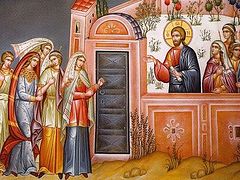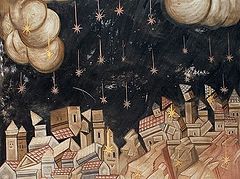“As the Lord went to His voluntary Passion, He said to His Apostles on the way: ‘Behold, we go up to Jerusalem, and the Son of Man shall be betrayed, as it is written of Him.’ Come, then, and let us also journey with Him, purified in mind; let us also be crucified with Him and die for His sake to the pleasures of this life, that we may also live with Him” (Holy Monday Vespers, 1st stichera).
When the Lord told His disciples: Our friend Lazarus sleepeth, one of them exclaimed on behalf of all: Let us also go, that we may die with Him (Jn. 11:11, 16). Now, brethren, the time is coming for the death not of Lazarus, but of our Lord Himself, Who says that, Ye know that after two days is the feast of the passover, and the Son of man is betrayed to be crucified (Mt. 26:2). Will any of us hesitate to say then: Let us also go, that we may die with Him? But, we shouldn’t just say this, but actually fulfill it. It was possible not to die with Lazraus, but we must die with our Lord and Savior. Have you heard how He calls us to this high honor? He that taketh not his cross, He says to all, and followeth after Me, is not worthy of Me (Mt. 10:38). After that, to renounce the cross and death with the Lord means to renounce the Lord Himself and His salvation. Who dares do this? Thus, brethren, come, come all of you, not just to journey with the Lord to His sufferings, to which we called you yesterday, but “let us also be crucified with Him and die for His sake to the pleasures of this life, that we may also live with Him.”
“But where are the Golgotha and the cross that are necessary for such a crucifixion?” Wherever we are, dear listener.
In fact, brethren, there can be no lack of physical crosses in this life. How many of the followers of Christ at different times and in different places have finished their lives like their Savior, on the Cross? And such instances can be repeated now, for a considerable part of the human race has heretofore regarded faith in the Crucified One as wickedness, and is ready to persecute His Cross with new crosses. A Christian isn’t obliged to seek these crosses, but when he encounters them, he must go to them, without hesitation. Therefore, everyone, in whatever place and rank he may be, must always nourish and strengthen a holy determination within himself—to stand, if necessary, for the name of his Savior even unto blood. He must do this in advance so that when danger comes, he would not shame his faith by fearing death and then make his Savior ashamed of such cowardice before God and the angels. And when is it more appropriate to strengthen this holy resolve to remain loyal to our Risen Savior unto death than in the days of His own sufferings and death?
But these crosses are for a few: There are others that are absolutely unavoidable for everyone, which it is always a transgression to avoid, for crucifixion upon them is the essence of Christianity. And first, brethren, the whole external world in which we live and move is arranged so that everything in it can become a cross for us. In the world, according to the great cross-bearer Paul, we are in perils of waters … in perils in the city, in perils in the wilderness, in perils in the sea (2 Cor. 11:26).
Second, every human society, to which we belong out of necessity, is such that everyone meets many crosses in it. And here, according to the same Apostle, we are in perils of robbers, in perils by [our] own countrymen, in perils by the heathen … in perils among false brethren (2 Cor. 11:26). Finally, the manifold composition of our humbled nature, distorted by sin, forms a terrible manifold cross for everyone. What a heavy cross our perishable and sinful flesh is for the spirit; and it can never be removed!
Its very appearance clearly shows this. All you have to do is stretch out your arms to see the full cross within yourself. All the more you see it when you stretch them forth in constant prayer; all the more will you see it when you stretch forth a helping hand to others, to protect the innocent persecuted, to defeat a strong and triumphant vice; all the more will you see it if these hands, which you decided to stretch forth for good, had previously loved evil, and were accustomed to being stretched forth for it. Paul was already crucified to the world. He’d been living a new life in Christ for a long time already; and yet, at times he felt the burden of the cross of the flesh so much that he cried out: O wretched man that I am! who shall deliver me from the body of this death? (Rom. 7:24).
Truly, there is no one to deliver us! For the spirit itself, destined to bear the cross of the flesh, contains within itself a multitude of crosses. Oh, how man in this present sinful state is divided, contradictory, self-hostile, self-tormenting! The conscience draws him to the side of duty and truth, and impure desires to the side of falsehood and crime. Faith draws his gaze to the mountains, but earthly wisdom binds it to the valley. Christian love disposes him to be everything to everyone, but self-love tries to subdue everyone and everything: So many compulsions! So much struggle and longing!
And where is the end of all these crosses of the flesh and spirit? In the same tomb, if only therein mortality may be swallowed up by [the] life of grace (2 Cor. 5:4). Otherwise, it will be necessary to go from many temporal crosses to an eternal cross.
Thus, in desiring to be crucified with Christ, don’t fear a lack of crosses. The wisdom of God knows how necessary it is for your old man to be crucified; and therefore, everything has been previously arranged for this execution of love to be carried out with him. From the cradle to the grave, you are incessantly called, led, and drawn to the cross—by all the shortcomings of the body and the soul, all the sorrows and deprivations, all the temptations and seductions. Only, don’t contradict and don’t persist, and you’ll be crucified in body and soul, mind and will, visibly and invisibly.
Do you want to know, beloved, what our own crucifixion should consist of? To comprehend this, imagine that you’re truly on the cross. What would happen to you then? You would lose freedom of movement in your hands and legs; the whole world would lose value for you; all its good would become alien to you, as if non-existent; you would have only one thing left in your mind and heart: how to be delivered from the Earth and the flesh sooner, and give your spirit to God. Put yourself in this state of spirit voluntarily, by the power of faith and love for Christ, and you’ll be crucified with Christ. He who is crucified with Christ has no movement of his own will, but everything is according to the will of God; his hands and feet are as immovable for evil and unrighteousness as the one crucified on the cross. The world with its benefits and temptations is unattractive to him. The thought of the end of his earthly pilgrimage is his favorite thought. He is already elevated in spirit from Earth to Heaven, and his life is hidden in God. Be like this and you will be crucified with Christ.
But how can we remain in this state of spirit that is extremely difficult for the flesh? And how, beloved, do the crucified remain on the cross?—By nails. Nail yourself to the cross of self-sacrifice—first, by the fear of God and the thought of God. The fear of the Lord driveth away sins (Sir. 1:21) and temptations, making a man immobile for evil and firm in good. Nail yourself to the cross by the remembrance of death. He who has his death before his eyes won’t stretch forth his hands to the forbidden fruit. Nail yourself with the hope of eternal blessings, which are promised to all who give their blood in battle. If the hope of a perishable crown directs thousands of people to obvious death, will the hope of a Heavenly crown not produce this? Nail yourself, finally, to the cross by love for your Savior, Who was crucified upon it. This love, by its very nature, hopeth all things, endureth all things. Love never faileth (1 Cor. 13:7-8). And these four nails are enough to hold even the heaviest flesh upon the cross of self-sacrifice.
“But this condition is terrible, tormenting! Is this really where the essence of Christianity is?” It is, beloved, in this state, terrible and tormenting for the old man. Are you afraid? But is not this old man of ours, condemned to crucifixion, himself terrible and tormenting? Didn’t he drive us out of Paradise? Hasn’t he tormented us our whole lives? Won’t he put us all in the grave and hand us over to corruption? Let’s at least not let him cast us into hell. Let us slay him by the power of the cross before he takes away our eternal life.
And what’s the use of avoiding the cross? It should have been done in Eden, before eating of the forbidden fruit, but now it’s impossible. We can’t lay down either the cross of the flesh or the cross of the spirit. We came into this world with them, and we will leave this world with them. The only thing that depends on our will is either to die to the world on this cross for God, or to die to God for the world; to give our spirit to Christ in faith and love, or to give our spirit to the devil in unbelief and self-love. Therefore, if wounds are unavoidable, it’s better to bear the wounds of the Lord than those of dour enemy. Suffering with the Lord, we are glorified with Him; but suffering with the world and the spirit of wickedness, what will we receive but eternal ignominy and torment?
Let us not forget, in our encouragement, that the Cross of Christ is fearful only temporarily, and after it is Paradise—not in Heaven only, but also here on Earth. An ordinary cross takes the life of the one crucified, but the Cross of Christ takes away the worldly, sinful life and gives a new life in God and in Christ in its place. He who has endured nearly all the crosses in the world testifies that as much as the outward man perish on this cross, so much the inward man is renewed day by day (2 Cor. 4:16). “As much as there is an abundance of sorrows for him who is crucified with Christ,” he says, “there is also an abundance of consolations of the Holy Spirit.” In fact, can anything be more joyful for a man than to rise from the grave? But the same thing is done to him who crucifies himself with Christ to the world and sin. The death of the flesh is followed by spiritual resurrection, which, in its very essence, is the most blessed state.
Thus, brethren, laying aside all perplexity and fear, let us follow our Lord to the cross of self-sacrifice. Our faith and love are in vain, He Himself, omnipotent and omnibenevolent, will hasten to strengthen our wavering footsteps in this holy and necessary labor.
Amen.




